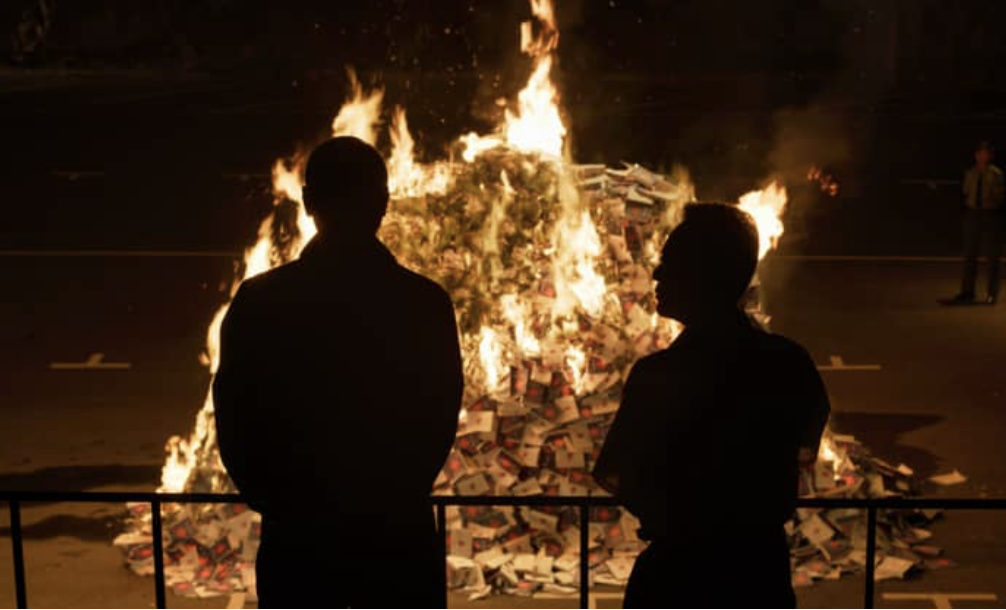Most of us have already left our seats and are halfway to the exits by the time the end credits of a movie start to roll (unless awaiting a Marvel after-credits scene). But the credit scroll of the movie I attended this past Friday contained something I had never seen before in all my thousands of hours of film-viewing and ten years of filmmaking: nearly half of the crew positions being marked “Anonymous” in lieu of a name. This was no mystery however. The film in question was a Canadian production filmed in Taiwan and tackled subject matter that a Hollywood predisposed to a Chinese audience wouldn’t dare to: the persecution of Falun Gong practitioners by the Communist Party of China.
In 1999 Beijing, university student Wang (Ting Wu) leads a local Falun Gong chapter with his girlfriend Li (He Tao) and friends Jun (Shih Cheng-Hao) and Xia (Chen Ying-Hu). Wang takes the practice very seriously, especially the tenant of “Truthfulness” which leads to friction in an academic life more concerned with the image of success than honest results.
Falun Gong has grown to such popularity that it attracts the attention of the ruling Communist party, personified here by sour-faced Secretary Yang (Wang Tzu-Chiang) who along with his superiors, is convinced that the population’s increasing dedication to the practice could undermine party solidarity. The word promptly goes out for a crackdown which sees practitioners arrested, false defamatory propaganda spread, Wang thrown out of school for refusing to renounce his faith and Li disowned by her parents.
As Wang and friends decide to fight back via a bold flyer and banner campaign to counter the state’s propaganda, visiting Chicago reporter Dannyl (Sam Trammell) can’t keep his camera from noticing something rotten in Beijing, the same city where he covered the Tiananmen Square massacre a decade before. He attempts to dig for the truth despite the apathy of his paper and the attempts of his state-planted assistant Min (Anastasia Lin) to dissuade him. As the government turns up the heat, even resorting to torture in order to stamp out Falun Gong, Danny finds that it’s not enough to just write the story, he’ll have to escape with it first.
You may be forgiven for not being entirely sure what Falun Gong actually is by the film’s conclusion. Aside from repeating the three main tenets of the practice: “Truthfulness, Compassion and Forbearance”, the film doesn’t seem all that interested in exploring Falun Gong’s origins or practices. This may be due to the fact that Falun Gong is, objectively speaking, a cult run by a megalomaniac, Li Hongzhi.
While generally presenting itself as a beinine spiritual movement focused mainly on qigong-inspired exercises, Falun Gong in fact goes much deeper with founder Li revered as a living god and followers told that they can achieve such supernatural feats as a levitation. In pursuit of this, homosexuality, mixed-race relationships and even medicine are frowned upon within the cult.
I say the above, not to justify practitioners’ barbaric treatment at the hands of Chinese authorities, but to point out that the film is essentially a piece of propaganda that fits nicely into a pro-Falun Gong media machine that includes The Epoch Times newspaper and the Shen Yun dance troupe. There are no shades of grey to be found as the pure-of-heart protagonists are pursued by shadowy-party operatives as a mostly-unsympathetic outside world turns a blind eye.
The whole production has a distinctly low-budget feel more akin to a Lifetime movie than a theatrical effort. This is evident from the occasionally hammy acting (Trammell’s performance oscillates mostly between wide-eyed bewilderment to simmering concern) to the noticeably anachronistically modern cars and technology on display in this supposedly 90s-set production.
Nonetheless, I’d be remiss if I said the film doesn’t at least make an earnest effort to mount a searing human drama. The core actors portraying the students acquit themselves quite well and the depiction of an increasingly alarming and calculated propaganda campaign against a controversial ideology has chilling modern-day parallels. It may be an incomplete story, but is nonetheless an important one.
On my way to the theatre, an elderly Chinese woman cheerfully handed me a flyer for this film that I was already on my way to see. It’s a grassroots type of film marketing I haven’t witnessed in a while (actress Jennifer Spence did something similar for Down River at Vancouver’s Fifth Avenue cinema back in 2013) and speaks to the underdog nature of the whole project. Unsilenced is a flawed film for what information it hides, but also a brave one for what it reveals. The amount of anonymous crew in the credits speaks volumes about what a perilous production this must have been, but I can only hope that this project’s completion means we’ll see more like it, including one that tackles the Uyghur genocide in Xinjiang. The Nazis can’t be the default cinematic villains forever.
6/10
Unsilenced is now screening in theatres across Canada and the US
Check out Nick’s interview with the director here.

